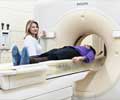Plaque detected in abdominal CT scan could be a strong predictor of coronary artery disease and mortality, according to a Henry Ford Hospital study.
Plaque detected in abdominal CT scan could be a strong predictor of coronary artery disease and mortality, according to a Henry Ford Hospital study.
Researchers found that patients are nearly 60 percent at risk of having coronary artery disease when the CT scan showed very high levels of abdominal aortic calcium, commonly known as plaque. High levels of the abdominal aortic calcium also increased their risk of dying, researchers say.Conversely, researchers found that the lack of abdominal aortic calcium, or AAC, was associated with a low risk of coronary artery disease, a chronic, progressive form of heart disease that results from a buildup of plaque in the arteries found on the surface of the heart,.
The study is being presented Sunday, March 14 at the 59th annual American College of Cardiology Scientific Sessions in Atlanta.
"If you get a CT scan on your abdomen, there's probably a good chance that image can provide us with more information about the health of your heart arteries," says Mouaz Al-Mallah, M.D., director of Cardiac Imaging Research at Henry Ford and lead author of the study.
"This study clearly demonstrates that higher scores of abdominal aortic calcium are associated with higher rates of coronary artery disease and mortality."
Prior research has shown that coronary artery calcium found by computed tomography or CT is strongly associated with coronary artery disease and mortality. However, little is known about the risk associated between AAC and coronary artery disease.
Advertisement
"If you have heart disease and abdominal aortic calcifications, your chance of dying is higher than just having heart disease alone," Dr. Al-Mallah says.
Advertisement
GPL













